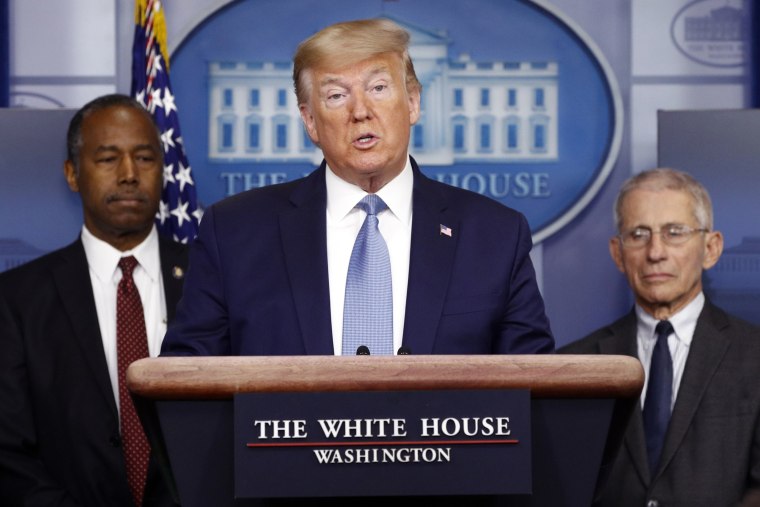Earlier this month, as Americans were just starting to come to terms with the coronavirus crisis, Donald Trump rejected the World Health Organization's assessment on fatality rates. As the president put it on March 4, "[T]his is just my hunch."
Just two days later, Trump visited the CDC in Atlanta, where he bragged about his purported familiarity with the subject matter. "You know, my uncle was a great person," he said. "He was at MIT. He taught at MIT for, I think, like a record number of years. He was a great super genius. Dr. John Trump. I like this stuff. I really get it. People are surprised that I understand it. Every one of these doctors said, 'How do you know so much about this? ' Maybe I have a natural ability."
I don't blame the president for having limits, but I do blame him for being wholly unaware of those limits. Trump seems to have convinced himself that he has an instinctive understanding of epidemiology -- a subject he knows even less about than government and policymaking.
It was against this backdrop that a reporter asked the president on Friday afternoon whether he's so eager to "put a positive spin on things" that he may be painting a misleading picture in areas such as medicinal treatments. Pointing to the possible use of malaria drugs with no track record of success in combating the coronavirus, Trump replied:
"Look, it may work and it may not work. And I agree with the doctor, what he said: It may work, it may not work. I feel good about it. That's all it is. Just a feeling. You know, I'm a smart guy. I feel good about it. And we're going to see. You're going to see soon enough."
According to the official White House transcript, the Republican added that he believes he can speak "from a lot of experience" -- and he did not appear to be kidding.
The NIH's Dr. Anthony Fauci appeared at the same briefing, and reminded everyone that there's only "anecdotal evidence" on the relevant efficacy on drugs such as chloroquine and hydroxychloroquine, but Trump was undeterred.
After all, he had "a feeling," and for the president who doesn't know what he doesn't know, that's enough.
He added yesterday, in reference to the anti-malarial medications, "They certainly are effective in other ways, and they are safe from the standpoint is that they're not killing people." That's not much of a "standpoint": in his eagerness to over-promise (again), Trump is brushing past the potentially serious side effects of the medications.
There may be some who wonder about the possible harm in reckless rhetoric like this. Either the medications will prove effective or they won't, Trump's uninformed guesses notwithstanding, so some may see the president's happy talk as inconsequential.
I find it far more difficult to be so sanguine on the matter. Not only is Trump playing with false hope during a deadly pandemic, but there's a real threat that he'll shape public policy while ignoring experts and going with his "hunches" and "feelings."
Postscript: ProPublica added in a report last week, "Trump’s push to use hydroxychloroquine to treat COVID-19 has triggered a run on the drug. Healthy people are stocking up just in case they come down with the disease. That has left lupus patients ... and those with rheumatoid arthritis suddenly confronting a lack of medication that safeguards them, and not only from the effects of those conditions. If they were required to take stronger drugs to suppress their immune systems, it could render them susceptible to more serious consequences should they get COVID-19."
